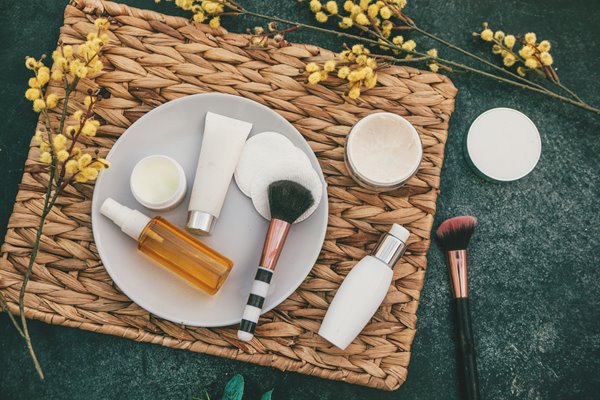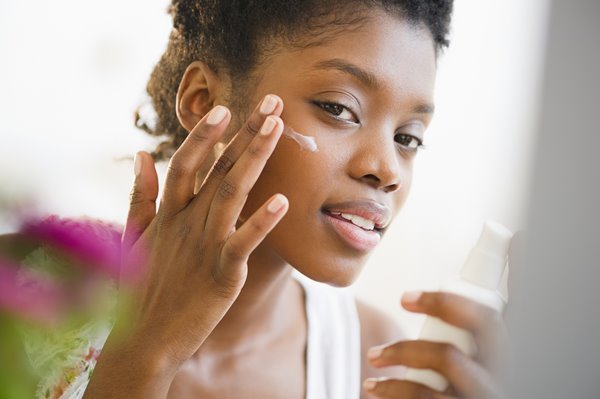Skin care is an important and often overlooked aspect of self-care. Even if you have clear skin and a great skin care routine, wearing a mask can cause unwanted changes. For some, pandemic-required face masks have highlighted the inadequacies in their skincare routine. Mask wearing can cause issues such as acne, dry skin, increased redness or irritation, skin congestion and potential bruising (due to extended use of an N95 respirator mask).
 Allison Wisniewski, CNP, Plastic Surgery, and aesthetician said keeping your mask clean is a good starting point to achieve healthy skin.
Allison Wisniewski, CNP, Plastic Surgery, and aesthetician said keeping your mask clean is a good starting point to achieve healthy skin.
“Wash your hands and use hand sanitizer every time you touch or remove your mask,” Wisniewski said. “Remove it by grabbing the loops instead of the front or back of the mask itself. Then, store your mask in a clean place such as a fresh paper bag. Wash your reusable or cloth mask, using hot water and dish soap rather than a washing machine.”
Detergents can cause irritation or breakouts. Wash it daily and rinse the mask well and let it air dry. You can also spay it with isopropyl alcohol and let it dry in a pinch.
Wisniewski recommends making sure your skin is clean and moisturized daily.
The Carle Plastic Surgery team can answer your skin care questions and advise on a customized treatment plan. In addition to skin care education, they provide a wide variety of other treatments like botox, dermal fillers and laser treatments. Ask for an assessment today by calling (217) 902-7527.
“Wash your face immediately after removing your mask at night,” she said. “If possible, try not to wear makeup in the area where your mask sits, and if you do, make sure it is non-comedogenic (won’t clog pores) and oil-free. In non-patient care environments, natural mask fabrics such as cotton and bamboo are the best options for your skin. Let the skin breathe when not at work or in public.”
 Even if you aren’t currently suffering from “maskne” or other mask-related skin issues, Wisniewski said some general skin care techniques can help achieve glowing skin.
Even if you aren’t currently suffering from “maskne” or other mask-related skin issues, Wisniewski said some general skin care techniques can help achieve glowing skin.
- Use a cleanser that is specific for your skin type. For example, if you have dry skin, use a hydrating cleanser. If you have oily/acne-prone skin, use a gel-based cleanser to help balance the oil or help with acne. Use daily and nightly.
- Do not use products that are too harsh or for exfoliating. Exfoliants can further irritate the skin or acne present. Use these products sparingly – once or twice a month to remove dead skin cells and help smooth skin. Occasional deep exfoliating procedures such as chemical peels are one of the best ways to exfoliate the skin safely and can help increase cell turnover and keep pores clear. This can be especially effective when done every 4-8 weeks.
- Don’t overdo it with skincare. If you find your skin is breaking out, use a few basic skincare products instead of several specialized products. Add one new skin product at a time for several weeks to see how the skin reacts. Use one or two products to treat acne, alternating between them to prevent excessive dryness or irritation. Use a salicylic acid wash to penetrate oil accumulation, or a benzoyl peroxide wash to kill bacteria.
- Try to keep skin as hydrated as possible. Use a moisturizer on your skin daily and nightly. Using moisturizer with SPF protects from the sun’s damaging rays and not only prevents against skin cancer, but also offers one of the best anti-aging products on the market. Apply a lighter moisturizer containing an SPF every morning and a heavier moisturizer not containing an SPF at night. If you spend time outdoors, reapply every two hours and drink water to keep the skin from feeling dry or overproducing oil. When the skin is dehydrated, it can feel dry or tight.
Categories: Staying Healthy
Tags: cosmetic surgery, COVID-19, skin care, surgical services, women’s health
